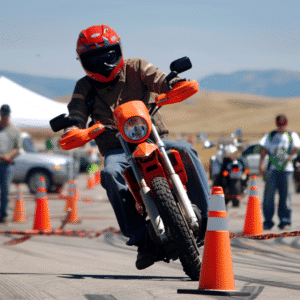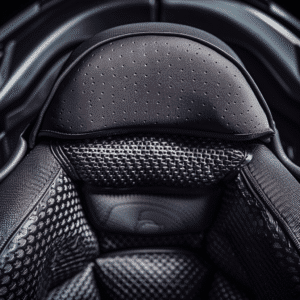
Are helmets required in Nevada for motorcycle riders and passengers? The answer is unequivocally yes. Nevada law mandates the use of DOT-approved helmets for all motorcycle operators and their passengers on public roadways. This introduction will guide you through the specifics of Nevada’s helmet requirements, the legal implications of non-compliance, and additional safety considerations for riders, ensuring you’re fully informed and compliant with state laws.
Key Takeaways
- In Nevada, all motorcyclists and passengers must wear DOT-approved helmets on public roadways, failure to do so results in fines and demerit points.
- Moped riders in Nevada are also legally required to wear helmets and, if necessary, eye protection on the roads.
- Obtaining a Class M license is essential for legal motorcycle operation in Nevada, and motorcycles must pass state-required safety inspections that include helmet compliance checks.
Contact us today and we will help you get the compensation that you deserve.
Nevada Helmet Regulations Explained
When it comes to Nevada motorcycle helmet laws, the rules are clear and uncompromising. Every motorcyclist, whether a driver or passenger, must wear a helmet when riding on public roadways. But not just any helmet will do. The law stipulates that the helmets worn must meet federal safety standards and bear a Department of Transportation (DOT) certification label. This requirement ensures that the helmet provides adequate protection, potentially saving lives during an unfortunate incident.
Enforcement of this law isn’t limited to the open highways. The mandate applies to all public roadways, including city streets and highways. So, whether you’re exploring the vast landscapes of Nevada or just commuting through the busy streets of Las Vegas, wearing a DOT-approved helmet is a must.
The Legal Mandate for Helmets
The federal safety standards for helmets are stringent and comprehensive, ensuring that every DOT-approved helmet offers the highest level of protection. The U.S. sets these standards. They are set by the U.S. Department of Transportation and are the basis for the legal mandate for helmets in Nevada.
It’s crucial to note that the responsibility of ensuring that helmets meet these standards falls on the manufacturers. Reputable companies perform rigorous testing in DOT-approved facilities within the United States, ensuring that every helmet they produce meets these standards and offers the maximum level of safety for riders.
Consequences of Non-Compliance
Ignoring the Nevada motorcycle helmet law can lead to serious consequences. First and foremost, not wearing a helmet while riding a motorcycle in Nevada can result in fines and the addition of demerit points to your license. The fines vary depending on the city – in Las Vegas, the civil penalty is $205, while in Reno, it’s $80. Additionally, two demerit points are applied to the rider’s license upon non-compliance with the helmet law.
But the financial penalties don’t stop at fines. Not wearing a helmet can also lead to an increase in your insurance premiums. Insurance providers view not wearing a helmet as a form of risky behavior, which can impact your rates. Furthermore, if you’re involved in an accident while not wearing a helmet, your compensation for injuries sustained could be reduced.
Protective Gear for Moped Riders in Nevada
While it’s clear that the Nevada motorcycle helmet law applies to motorcycles, it’s also important to note its relevance to moped riders. In Nevada, moped drivers are also required by law to wear a helmet. This mandate applies explicitly to drivers and passengers on vehicles such as motorcycles, mopeds, and trimobiles equipped with handlebars and a saddle seat.
This requirement was instituted on October 1, 2019, ensuring the safety of all moped riders on Nevada’s roads.
Eye Protection Requirements
Aside from wearing a helmet, moped owners in Nevada should be aware that riders are also required to wear eye protection if their moped lacks a transparent windscreen. This could be goggles, glasses, or a face shield.
This regulation is an essential part of Nevada moped laws, further emphasizing the state’s commitment to the safety of all riders on its roads.
Headgear Rules for Motorcycle Passengers
Nevada law extends the helmet requirement to motorcycle passengers. Regardless of the length of the journey or the speed, passengers are required, without exception, to wear helmets that comply with the safety standards established by the U.S. Department of Transportation.
This regulation ensures that not only drivers but also passengers are adequately protected when traveling on a motor vehicle, such as a motorcycle, at maximum speed.
Safety Benefits of Wearing Motorcycle Helmets
While the legal implications of not wearing a helmet are significant, the safety benefits of wearing a motorcycle helmet are even more crucial. Studies show that wearing a helmet significantly reduces the risk of serious and fatal head injuries. Helmets are reported to be 37% effective in preventing motorcycle rider fatalities and 41% effective for passengers. Moreover, the use of helmets lowers the risk of brain injury among motorcyclists by over 69%.
These statistics underscore the importance of helmet use. Without a helmet, motorcycle crashes can lead to severe and permanently disabling head injuries. Therefore, wearing a helmet isn’t just about complying with the law; it’s about protecting your life and well-being.
Licensing and Equipment Standards
In Nevada, acquiring a Class M license is a pre-requisite for riding a motorcycle. Additionally, all motorcycles are subject to a state-required safety inspection to ensure compliance with helmet regulations and other safety standards.
Obtaining a Class M License

For riders above 18 years old, an instruction permit can be obtained. This permit allows them to ride under certain restrictions, such as supervised riding and daylight driving without passengers. Furthermore, applicants under 18 years old must adhere to Nevada’s teenage driving laws, which include holding a motorcycle instruction permit for six months and logging 50 hours of supervised riding.
Additionally, Nevada mandates the following requirements for obtaining a motorcycle license, which is separate from a driver’s license:
- A vision test for all motorcycle license applicants
- Those who graduate from the MSF course can present their Certificate of Completion to the DMV, which allows them to bypass the written and skills tests
- Applicants who fail the skills test more than once are required to complete a course to obtain their Class M license.
Equipment Inspection
Apart from licensing, motorcycles in Nevada are subject to a state-required safety inspection, which includes ensuring compliance with helmet regulations. During the helmet inspection, it’s verified that helmets have chinstraps riveted to the helmet and bear labeling with the manufacturer’s details and a DOT sticker.
It’s worth noting that while motorcycles must pass safety inspections, they are exempt from emission inspections and odometer reporting in Nevada. This exemption means that while the focus remains on the safety of the rider, the state is less concerned about the environmental impact and mileage of motorcycles.
Insurance Implications for Helmet Non-Use
Helmet use isn’t just about legal compliance and safety; it also has significant insurance implications. In the case of a motorcycle accident in Nevada, helmet use is one of the factors examined when determining liability, especially if a traumatic brain injury is involved.
Choosing not to wear a helmet can lead to higher insurance premiums. Insurance providers see not wearing a helmet as risky behavior, which can impact your rates. Additionally, if you’re involved in an accident while not wearing a helmet, your compensation for injuries sustained could be reduced. Therefore, wearing a helmet is not only a smart safety and legal move but also a wise financial decision.
How to Choose the Right Helmet
Choosing the right helmet is crucial for your safety and comfort. You need to consider your head shape and ensure that the helmet does not create pressure points on the forehead or the sides of your head.
Sizing and Fit
Proper helmet sizing and fit are vital for comfort and safety. The first step to finding a helmet that fits well is to measure the circumference of your head just above the eyebrows. After measuring, refer to a size chart to find the appropriate helmet size that provides even pressure all around.
A correctly fitting helmet should be snug but not too tight, allowing comfort without creating pressure points. Minimal movement should occur when the head is shaken if the helmet fits properly.
Model Type and Safety Ratings

- a minimum weight of three pounds
- a thick inner liner
- strong chin straps
- a DOT sticker indicating compliance.
Aside from these safety standards, there are various helmet models designed for different motorcycle types and riding styles, including:
- Full-face helmets
- Modular helmets
- Dual-sport helmets
- Off-road helmets
- Hi-viz helmets
Moreover, SNELL certification is a highly esteemed safety standard for helmets that involves comprehensive testing for impact, penetration, and other crucial safety aspects.
Legal Exceptions and Exemptions
While Nevada’s helmet laws are comprehensive, there are some exceptions. Certain three-wheeled vehicles are not subject to Nevada’s helmet law. If three-wheeled vehicles have an enclosed cab and a steering wheel instead of handlebars, then the riders are exempt from wearing a helmet. This exemption is based on the vehicle meeting these specific requirements..
Drivers and passengers on these specific motor vehicles with three wheels in contact are legally permitted to operate or ride without a helmet, unlike motor vehicles that require helmets for safety.
Navigating Helmet Law Offenses
Despite the clear regulations, some riders may find themselves facing a helmet law violation. In these instances, it’s important to know how to navigate the offense, including how to contest a citation and when to seek legal assistance.
Contesting a Citation
In Nevada, a citation for a helmet law violation can be contested by demonstrating that the vehicle in question was not a motorcycle or the individual was not on a public road at the time of the alleged offense. Gathering evidence such as photographs and witness statements is crucial when contesting a helmet law violation, as they can provide counterpoints to the officer’s observations.
Seeking Legal Assistance
When faced with a helmet law violation, hiring private counsel can be beneficial. Here are some reasons why:
- Attorneys are knowledgeable about local legal processes and can often negotiate better outcomes.
- Defense attorneys specialize in working with local prosecutors and judges and are frequently more successful in getting charges reduced or dismissed.
- Hiring an attorney represents a good investment in legal representation.
Experienced traffic attorneys provide expertise that can be crucial in negotiating with prosecutors and judges, which may lead to reduced penalties or alternative sentencing. Hiring a traffic attorney can offer reassurance and reduce the stress associated with self-representation in traffic court.
Frequently Asked Questions
Do you have to wear a helmet on a motorcycle in Nevada?
Yes, in Nevada, all motorcycle riders are required to wear helmets approved by the U.S. Department of Transportation, as failure to comply can result in fines and demerit points on the rider’s license.
How much is a no helmet ticket in Nevada?
In Nevada, a no helmet ticket will cost you a $205 base fine, in addition to a two-point penalty on your driver’s license and special assessment fees to the DMV.
What states do not wear helmets?
Illinois, Iowa, and New Hampshire are the only states that do not have motorcycle helmet laws, according to the National Highway Traffic Safety Administration.
What are the motorcycle laws in Nevada?
In Nevada, motorcycle riders are required to wear helmets and either goggles or protective face shields, and lane-splitting is unlawful. They also have the right to use a complete traffic lane and cannot pass or ride next to another vehicle in the same travel lane.
Are moped riders in Nevada also required to wear helmets?
Yes, moped riders in Nevada are required to wear helmets as per the state law.
Last updated Thursday, April 25th, 2024 | Written by Anthony B. Golden






